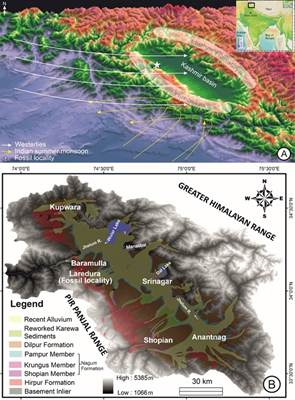NewzVille Exclusive
An interview study by Indian Scientists has revealed that the Kashmir Valley, now known for its cool, Mediterranean-type climate, was once a warm, humid subtropical paradise. This ancient climate, long buried in the past, has been resurrected by probing fossilized leaves and mountain-building forces.
As part of the rich fossil leaf collection curated by the late Prof. Birbal Sahni and Dr. G.S. Puri, housed at the Birbal Sahni Institute of Palaeosciences (BSIP), Lucknow, an autonomous institute of the Department of Science and Technology (DST) were collections recovered from the Karewa sediments of the Kashmir Valley.
These displayed remarkable diversity and preservation. Many of the specimens resembled subtropical taxa that no longer exist in the region’s current temperate climate.
A group of researchers from BSIP were intrigued by the striking mismatch between past and present vegetation and this prompted their scientific investigation into the climatic and tectonic history of the Kashmir Valley using modern palaeobotanical methodologies.
Dr. Harshita Bhatia, Dr. Reyaz Ahmad Dar and Dr. Gaurav Srivastava linked this dramatic shift to the tectonic uplift of the Pir Panjal Range, a sub-Himalayan Mountain range that gradually rose and blocked the Indian summer monsoon from reaching the valley.
By doing so, these rising mountains cut off the water supply, drying out the lush forests and transforming the region’s climate from subtropical to Mediterranean over millennia.





